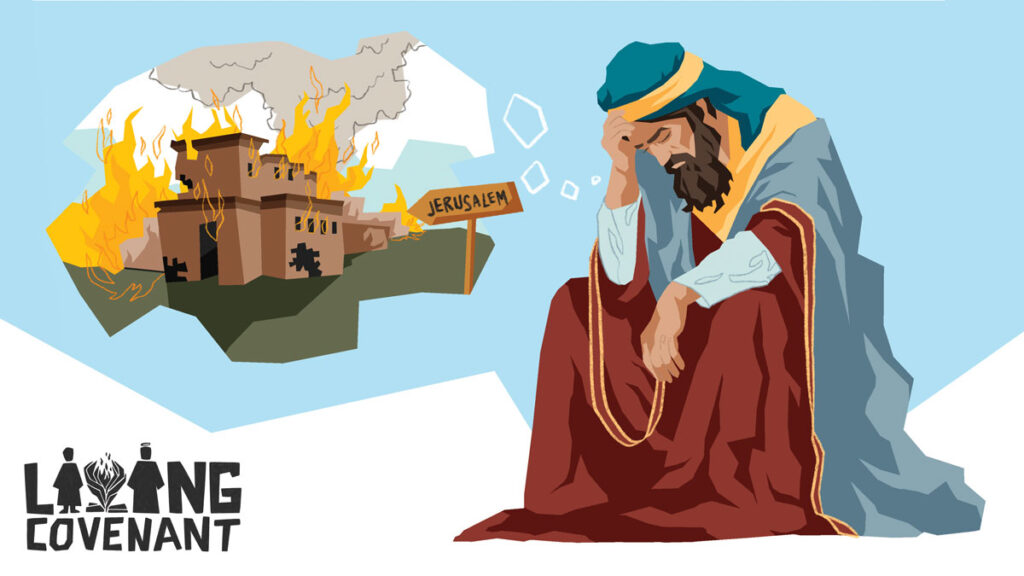Pentecost dramatically impacted the early church. Many Christians regard Pentecost as the “birthday of the Christian church.”1 On that amazing morning, crowds in Jerusalem exclaimed, “Look, are not all these who speak Galileans? And how is it that we hear, each in our own language in which we were born? . . . we hear them speaking in our own tongues the wonderful works of God” (Acts 2:7,8,11).2 The church exploded in number from 120 to 3000.
Pentecost, however, was a Jewish feast; Pentecost being the Greek version of Shavu’ot, the Feast of Weeks celebrated seven weeks, or 50 days, after Passover (Leviticus 23:15-22).
All Jewish feasts had both historical and prophetic importance. Recognition of this helps elucidate the true meaning of these feasts, and especially the significance for us today of why God chose the Feast of Pentecost to pour out the Holy Spirit, and not the Feast of Firstfruits, occurring seven days after Passover and the sacrificial death of Jesus, or perhaps Yom Kippur, the Day of Judgement.
There were seven Jewish feasts (Leviticus 23). The Sabbath pointed back to creation (Exodus 20:11), but also to His work of redemption from slavery (Deuteronomy 5:15), and finally to the re-creation of a perfect world when sin is obliterated forever (Revelation 21:1-4). Passover and the Feast of First Fruits pointed back to the triumphant exodus from Egypt, but forward to the sacrifice of Jesus (1 Corinthians 5:7), and ultimately to the supreme exodus of all God’s people from the slavery of this sin-filled world. The Day of Atonement reminded the Israelites of the tragic death of Nadab and Abihu (Leviticus 16:1), and pointed forward to the great end-time judgement when all humans will stand before the judgement seat of God (Romans 14:10). The Feast of Tabernacles remembered the temporary shelters of the wandering in the wilderness (Leviticus 23:43) and was the promise of enjoying the yield of fruitful trees in the Promised Land, and also the rejoicing when God’s people gather in the Promised Land of heaven.
But what did the Feast of Weeks commemorate? It undoubtedly pointed forward to the bountiful harvests Israel would experience under the blessing of God in Canaan, and the New Testament Pentecost shows the best of all harvests was the gathering of all people into the knowledge of the gospel. This was anticipated in the instructions for the feast, in what may appear to be an irrelevant footnote to the general instructions: “When you reap the harvest of your land, you shall not wholly reap the corners of your field when you reap, nor shall you gather any gleaning from your harvest. You shall leave them for the poor and the stranger: I am the Lord your God” (Leviticus 23:22, italics supplied).
But what was the historical event this feast commemorated?
Although not explicit, the Bible clearly records that approximately 50 days after the drama of Exodus something stupendous happened (Exodus 19:1—20:17). The two-moon gap between the Exodus and the giving of the Ten Commandments computes to about 50 days. Furthermore, contemporary Jews recognise that Shavu’ot historically commemorates the giving of the Torah, specifically the Ten Commandments.3
“At Shavuot (Pentecost) the Jews celebrate the receiving of the Torah on Mount Sinai, which was literally the beginning of Judaism. For Christians Pentecost . . . was literally the beginning of the church . . . ”4
Thus, Pentecost was the formal inauguration of both the Jewish covenant with God and the Christian.
This association of Pentecost with the law-giving on Sinai makes the New Testament Pentecost of great interest.
At Sinai God presented Himself to His people as fire on the mountain (Exodus 19:18, Deuteronomy 5:5, 6:24,25) and, through law that revealed God’s character and government, God formally presented Himself as the covenant-keeping God. The people responded three times, “All that the Lord has said we will do” (Exodus 19:8; 24:3,7). At the New Testament Pentecost God again presented Himself as fire, and the gospel message of God’s self-sacrificing love was heard by a large group of people.
Author Eugene Peterson states: “The . . . theme of Pentecost is the covenant revelation at Sinai. The Torah reading assigned to the Feast tells the story of the revelation on Mt Sinai in Exodus 19,20, and the liturgy of the day remembers the event. At Sinai Israel found structure and direction for the redeemed life . . . At Sinai God revealed His ways and showed how all behaviour and all relationships were included in the structure of redemption . . . The first two sentences [regarded by Jews as the first commandment] in the Sinai revelation set the two realities side by side: ‘I am the Lord your God, who brought you out of the land of Egypt, out of the house of bondage. You shall have no other gods before me’ (Exodus 20:2,3).
“The Hebrews would no more have considered the covenant Ten Commandments as a burden in living a life of faith than a person would call nouns, verbs and prepositions a burden in carrying on a conversation.”5
Adventist scholar Jon Dybdahl noted: “Three times in [Exodus] 23:14-17 Israel is commanded to celebrate . . . The second of these feasts is called the feast of harvest, or of Weeks, or Pentecost. It occurred 50 days after the feast of Unleavened Bread in Israel’s third religious month . . . It was a festival of great joy celebrating the harvest of grains other than barley. During the feast, wheat from the new harvest was presented to God. In a religious sense, it commemorated the giving of the law on Mt Sinai.”6 [pullquote]
The Jewish disciples at the time of Pentecost knew what the feast commemorated. Most of them had probably just heard in the synagogue, or read together, the prescribed Torah reading for Shavu’ot that climaxes in the Ten Commandments. As the tongues of fire fell on them they knew their significance. Significantly, the liturgy of Pentecost also included the book of Ruth.7 This should have enabled them to appreciate the great harvest from all nations, exemplified by the inclusion of Ruth, the outcast Moabite, who was brought into fellowship with God’s people.
Therefore, any true understanding of the blessing of Pentecost must include appreciation of the blessings and importance of God’s law, all of God’s law, including the fourth commandment.
The revelation of the character of God through both the sacrifice of Jesus and the Ten Commandments is the true understanding of the Hebrew Pentecost in the Old Testament, of the apostolic Pentecost of the New Testament, and the final Pentecost that will herald the soon return of Jesus Christ.
Pentecost is thus significant not for the strange, unbiblical “sign” of glossolalia, but for bringing people into covenant relationship with God and His Good News of salvation to all people through Jesus Christ.
It becomes truly the “everlasting gospel to preach to those who dwell on earth . . . , ‘Fear God and give glory to Him . . . and worship Him who made heaven and earth, the sea and springs of water’” (Revelation 14:6,7).
Pentecost upholds the law of God, endorses its eternal nature, and rejoices in the freely-offered redemption that comes to all who believe in the amazing sacrifice of Jesus Christ. The only way we can share the end-time message of the three angels’ messages is through the power of a baptism of the Holy Spirit, a renewed Pentecost.
Dr Elizabeth Ostring is a retired musculoskeletal and family physician with a doctorate in Theology, living in New Wealand.






